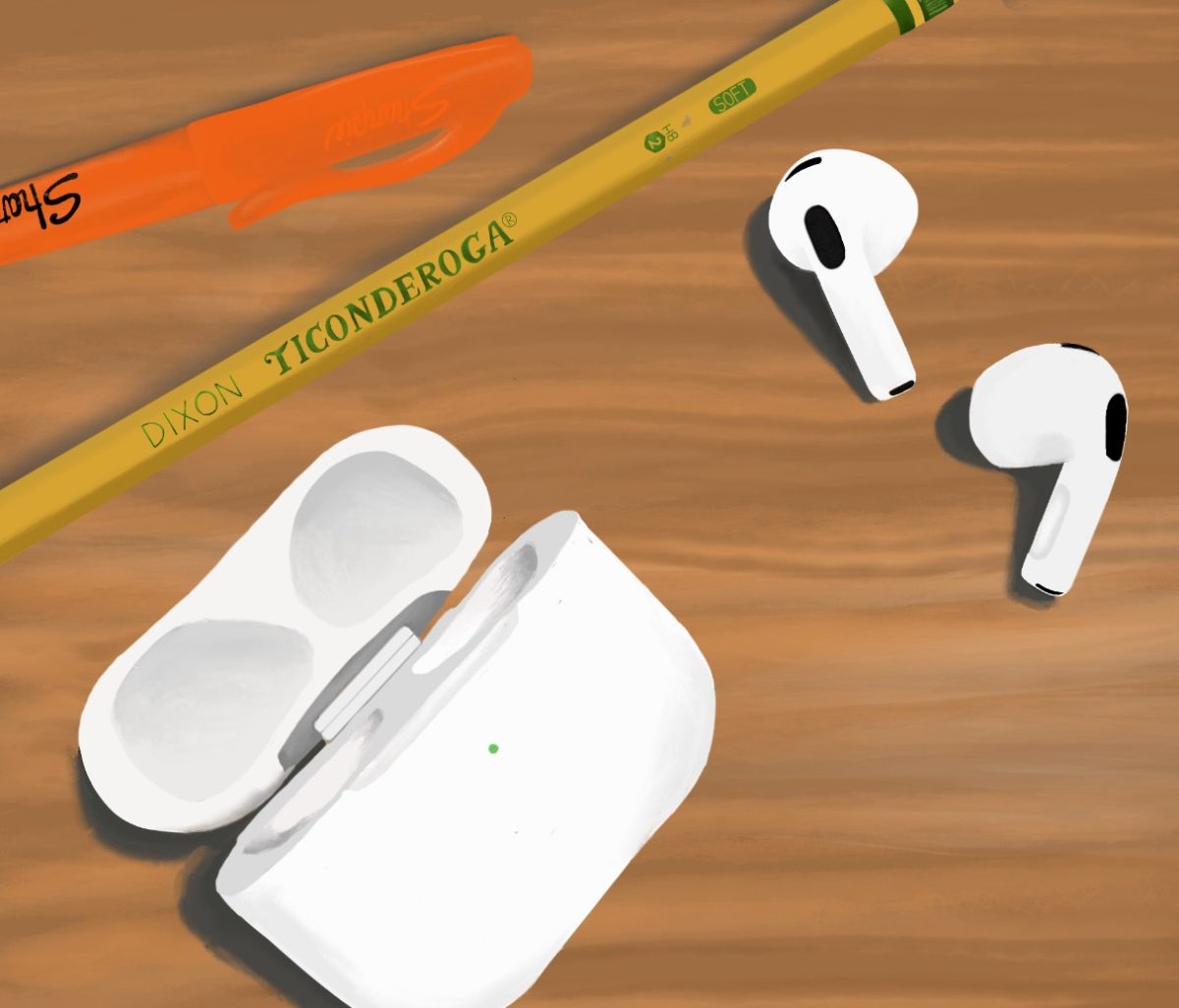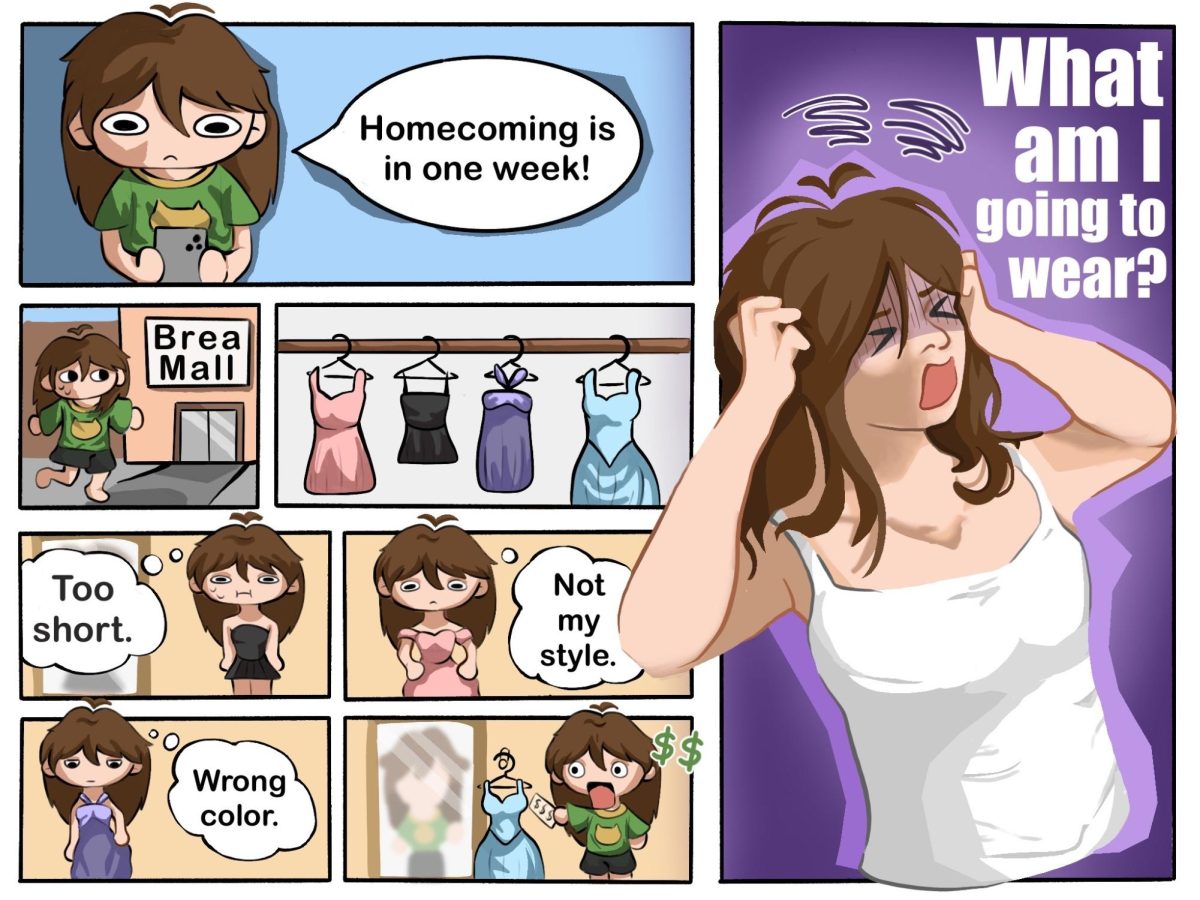From study sessions at Starbucks to Brea Olinda High School classrooms, AirPods and over-the-ear headphones are omnipresent. But does listening to Billie Eilish and Beethoven help with studying, or is it a distraction from learning and retaining information? Answers differ depending on whom you ask, from those who insist music helps them relax and concentrate on learning, to those who prefer silence when they hit the books.
For Sarah Swift (’29), classical music helps her concentrate and stay motivated when studying for her Honors Biology class. “I’m in orchestra, so I enjoy the sound of stringed instruments,” Swift said. “It helps me focus.”
Dara Aung-Pfingsten (’29) listens to music to make schoolwork “enjoyable” and to help her “lock in” to her studies. “Listening to music blocks out background noise,” Aung-Pfingsten said. For the ninth grader, tuning in to a calming classical piece is preferable to listening to the cacophony of chattering students, rustling papers, and pencils being sharpened.
Even minor sounds can overwhelm the mind, making it challenging to immerse in homework completely.
“Music can be helpful with background noise to help filter out stuff so you can be in a place where it’s a bit more noisy and focus on what you’re doing,” Jason Beye, BOHS psychologist, said. According to Beye, background music not only reduces distractions, but also produces healthy stimuli when studying.
“When you’re listening to music, you don’t know how much time has passed, right? Your brain is being occupied and stimulated by what you’re doing,” Beye said. This mental state of deep focus — called “flow” — helps students become fully engrossed in an activity.
For subjects such as reading and writing, instrumental music helps engage the mind instead of splitting the listener’s attention, according to studies. Instrumental tracks, like ambient beats and classical pieces, can improve concentration and attention spans, and even relieve stress and anxiety levels.
Serafina Pressman (‘28) listens to music while she studies to revive past memories, including subjects she’s studied, a process called music-evoked autobiographical memory. “If I play a certain song while studying one subject, I’ll associate it with that song, and it’ll click in my brain faster,” Pressman said.
For Pressman, what she’s studying dictates what she listens to. “I try to find a certain music that helps [me] get into a flow state faster, because then that’s what I really lock in on my work,” Pressman said. “And it’s good work, too.”
But for some students and teachers, listening to music is a distraction and deterrent to retaining information.
Gil Rotblum, history teacher, bans headphones from his classroom due to their impact on learning.
“Students get distracted by their music,” Rotblum said.
The veteran history teacher noted that students get preoccupied with their phones instead of listening with intention.
“If students say music helps them concentrate, I tell them to pretend like we are teenagers in the Renaissance and we have to learn without it,” Rotblum said. “They get to experience history while they learn it. The greatest thinkers of the 15th century did without headphones, and so can you.”
Johnpaul Wilson (’07), history teacher, agrees with Rotblum that listening to music limits learning.
“I believe [music] can be a mechanism for students to zone out, and when they should be working, they are dreaming of something the music creates in their head,” Wilson said.
While some students, like Aung-Pfingsten, find music helps them concentrate, others, like Noani Saldonido (‘25), find it distracting.
“Music stops me from focusing on what I’m doing, especially if it’s English and I’m reading,” Saldonido said. “I can’t read and listen to music at the same time.”
Researchers Alessandra Souza and Luís Carlos Leal Barbosa found that since music and reading involve the processing of language, performing both tasks simultaneously impairs productivity. When the brain attempts to process dueling information, both clash against each other, resulting in mental fatigue.
Alex Koers, English teacher, does not allow his students to listen to music while reading due to that conflict. “I’ll admit to listening to some Metallica or Journey while grading or editing,” Koers said. “But I just don’t think it’s possible to be fully immersed in Frankenstein or Hamlet while listening to Olivia Rodrigo.”
Isabella Luarca (‘26) chooses to study in silence. “If I have music in my head and I’m trying to do an assignment, my brain will go back and forth,” Luarca said. “It’s hard for me to get anything done.”
“If you’re in the act of initial learning, trying to understand or be taught something, music can be a distraction,” Beye said. “Because if you have music with a lot of lyrics or vocals, you can then get caught up in what’s being said as opposed to just doing what you’re doing, as opposed to just instrumentals or just, calmer music, classical music even, that could be helpful in actually studying.”
Ultimately, whether a student benefits or not from listening to music, “depends on the setting or what the situation is, and what type of music,” Beye said. The psychologist acknowledged that “music can be a tool to support a a routine.”
For some, like Pressman, blasting the hits while note-taking in history class produces better work, but for others, like Saldonido, even ambient sounds create distraction. There isn’t a one-tune-fits-all answer, with variables ranging from what’s being studied (math versus English, for instance), to who is doing the studying.
As psychology teacher Jill Matyuch said, “It all depends.”
















